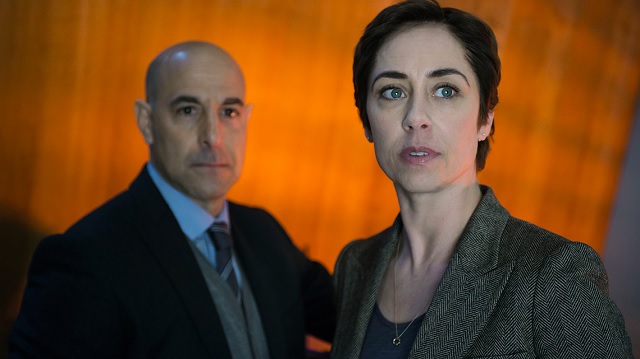Fortitude, Season One, “Episode Four”
Written by Stephen Brady
Directed by Richard Laxton
Airs Thursdays at 10 pm (ET) on Pivot
Not as immediately visually arresting or mystifying as its preceding episodes, the newest chapter of Fortitude is the first to feel like a typical murder mystery. There are a few nice transitions—a shot of the polio-stricken young boy sitting in an incubator cuts to a shot of a derelict statue, a restaurant mascot perhaps, lying supine in the snow—and the pulsating, unstable music is still as cutting as the sharpest winter wind, but gone are the flashier touches, the super-tight compositions. The show continues to move centrifugal from the mysticism of the first episode, which, while inevitable, nonetheless comes as a sort of disappointment, given the profound beauty of that first hour. As the plot expands, the mystery becomes less sublime and more in the vein of a typical prestige television show. Not to say Fortitude is by any definition bad, but the more familiar it gets, the less special it feels.
DCI Morton (Stanley Tucci) mostly plays second fiddle in this episode, though he does liken Fortitude’s coffee to gravel right to the governor’s face. Calling him the “main” character feels wrong, even if that’s how the show is marketed. If anyone should be considered the universal connector of all the show’s events, it’s Sheriff Anderssen (Richard Dormer), though Henry Tyson (Michael Gambon) continues to exhume the deepest, most earnest emotional responses of the characters. Chalk it up to Gambon’s remarkable body language—he turns Tyson into a sagging, word-slurring sad sack, a shell of a man whose home is festooned with beautiful pictures of nature’s brutality. (When Morton asks him how close he has to get to take a picture of a polar bear ravaging an animal, Gambon woozily holds his arms up and says, “I use a long lens,” and something about his delivery is funny yet sad, as if we’re watching a man see his life slipping away.)
Tyson feels consumed by guilt over killing the man in the show’s first episode—the man who, it should be remembered, was being mauled by a bear, and already minus one leg. A few drinks deep and deeply miserable, he talks to Anderssen in slurred undertones. Anderssen, in turn, tells Tyson that it was his (Anderssen’s) responsibility to kill the guy, and it’s Anderssen’s responsibility to make it right. What does this mean—his responsibility? Why was he even there, sitting in an idling car? But Anderssen goes mum. Tyson reminds the Sheriff that there’s still the murder of Professor Stoddart (Christopher Eccleston) to solve, before hitting the bottle some more.
At this point, Anderssen seems less like The Bad Guy and more like a bad guy; that blood-soaked shirt left by Officer Frank Sutter (Nicholas Pinnock) is finally discovered, and Anderssen, clearly pissed, runs through the snowy streets to the hotel where Sutter and his mistress are staying. Anderssen barges into the bathroom and slugs the naked Sutter until blood adorns the shower walls. (DCI Morton is in the next room shaving when this goes down, because it’s a small town.)
Eric Odegard (Björn Hlynur Haraldsson), who hasn’t been important up until now, claims to be the real power behind the throne in Fortitude, and that his wife, the governor (Sofie Gråbøl, still not having much to do) is just a pawn. He literally says, “But don’t tell her that. It’ll kill her.” Why do people say ominous things like that? If someone maniacally intoned that, emphasizing the “kill my wife” part, I would be suspicious. Ugh, whatever.
Meanwhile, Ronnie (Johnny Harris) goes off his meds—anti-psychotic meds—and, after a violent outburst, runs off with his daughter. After the scientists confirm that the bone Stoddart had was indeed that of a wholly mammoth, Ronnie’s co-conspirator Jason (Aaron McCusker) lies to the scientists about where they found the bone, though Vincent Rattrey (Luke Treadaway) warns Jason that he’s legally obligated to turn over the remains.
Got all that?
People often liken the story of an ensemble show to interwoven threads, and say something like, “The threads are coming together,” or “tying up loose ends.” This implies a natural cohesion, something organic guided by human hands. Simon Donald’s story feels more akin to synthetic fibers fraying at the ends and being fused back together. Fortitude may be overtly concerned with the innate dangers of the arctic—the bitter cold, the permafrost, bears waiting to tear you to shreds—but it’s human deception that continues to drive the show. Donald hides things from us; the clues aren’t so much buried in the ice, like the mammoth that set the story in motion, waiting to be dug up, but are concealed by people in garbage bins, in sheds, and on answering machines. Nature doesn’t lie to you. All you have to do to know whether it’s cold or not is to step outside. This clash between nature and culture, between the intrinsically honest forces outside and the chilly sense that no one in this town can be trusted, keeps Fortitude interesting. The structure of a town inhabited by people who don’t really know each other, and who betray each other, is more interesting than who killed the Professor.


